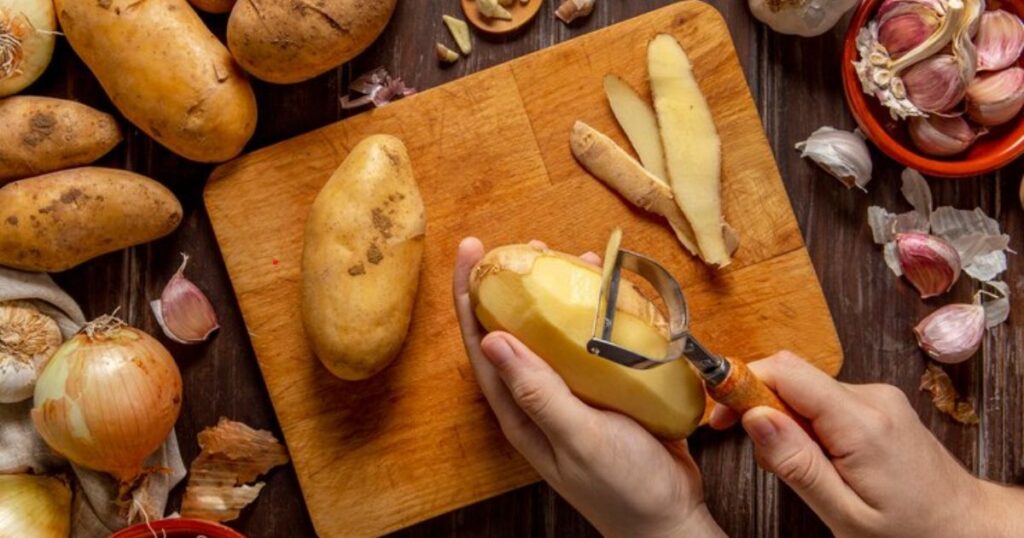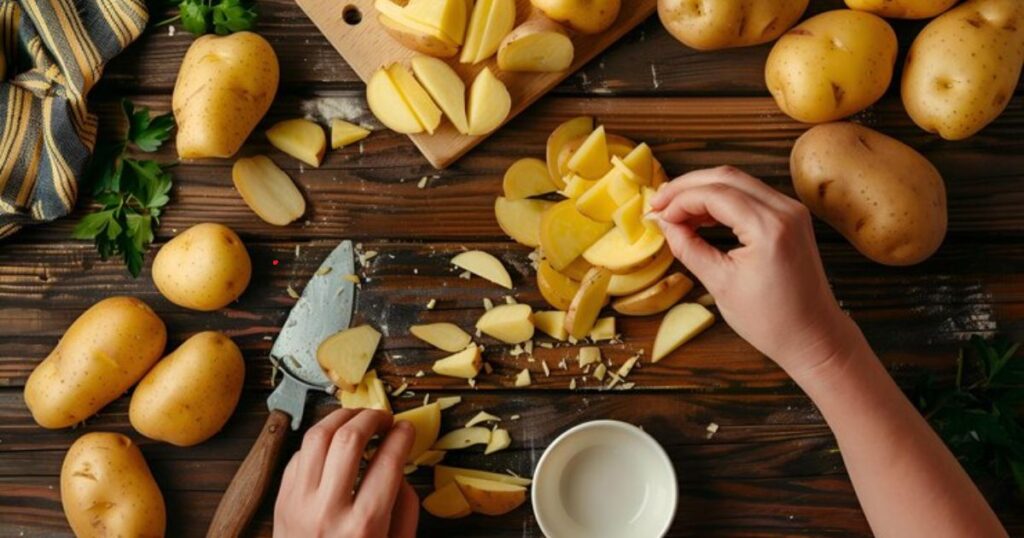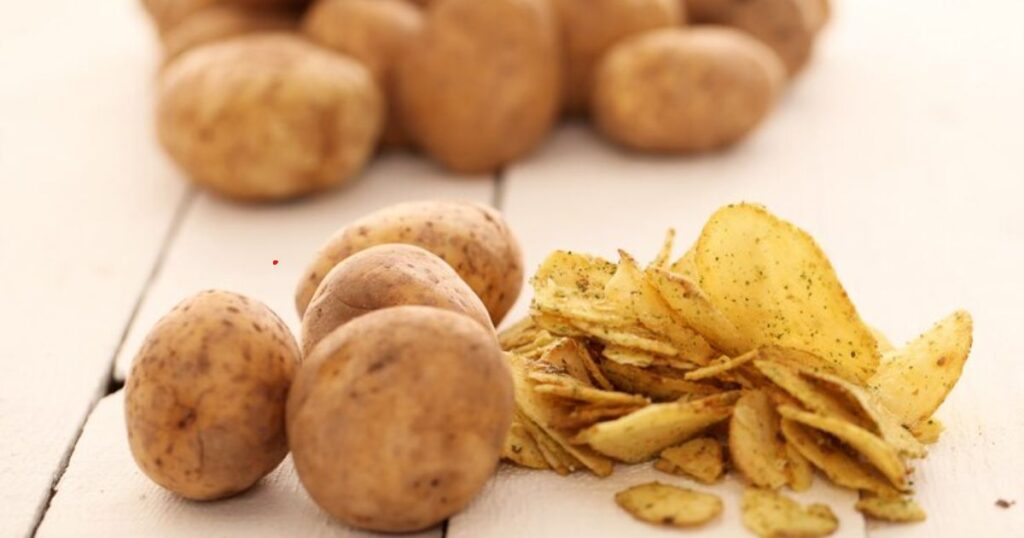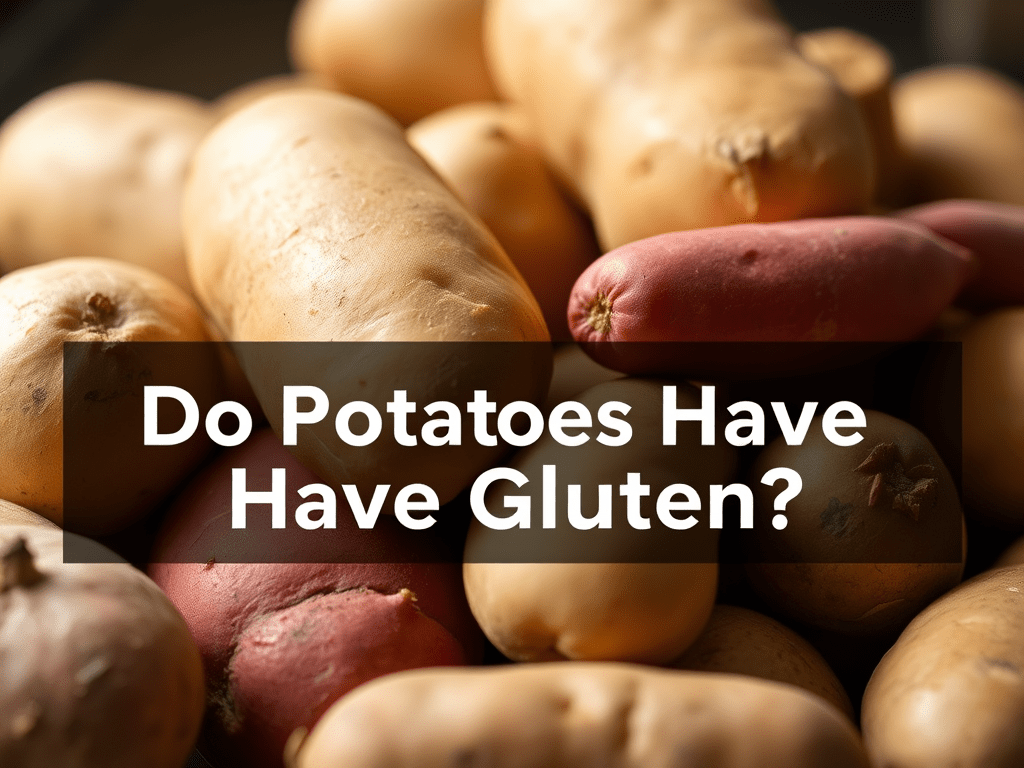If you can’t eat gluten or have celiac disease, it’s really important to know what foods you can safely eat. Potatoes are a very popular vegetable that many people around the world eat. But are potatoes safe for you if you need to avoid gluten? In this article, we will explore the connection between potatoes and gluten to help you find out if potatoes are okay to eat on a gluten-free diet.
What Is Gluten?
Gluten is a protein found in various cereals, including wheat, barley, and rye. It helps foods keep their shape by serving as a glue to hold them together. Gluten is typically present in bread, pasta, cereals, and baked products.
While most individuals can eat gluten without trouble, those with celiac disease or gluten sensitivity should avoid it since it might cause digestive difficulties or activate an immunological reaction in their body.
What Foods Contain Gluten?
Foods that contain gluten are primarily made from wheat, barley, and rye. Here are common examples:
- Processed Foods – Some sauces, soups, and processed meats may have gluten as an ingredient. Must avoid these foods to prevent health issues.
- Bread – Most types of bread, including white, whole wheat, and multigrain.
- Pasta – Regular pasta made from wheat flour.
- Cereal – Many breakfast cereals, especially those made from wheat or barley.
- Baked Goods – Cookies, cakes, muffins, and pastries often contain gluten.
- Pizza Dough – Regular pizza crust is made with wheat flour.
- Crackers – Many snack crackers are made with wheat flour.
- Beer – Most beers are made from barley, which contains gluten.
Related: Are Grits Gluten-Free? Brands Analysis
Related: Are Corn Flakes Gluten-Free? Checked in 2024
Are Potatoes Gluten-Free?
Yes, potatoes are naturally gluten free. They are a starchy vegetable that does not contain gluten, a protein found in cereals such as wheat, barley, and rye. However, if potatoes are processed or cooked with gluten-containing ingredients (for example, in breaded or fried foods), they may no longer be gluten-free. If you are gluten-free, you must exercise caution when preparing potatoes.

Why Potatoes Are Naturally Gluten-Free
Potatoes are naturally gluten-free because they are vegetables, not grains. Gluten is a protein present only in specific cereals, including wheat, barley, and rye. Potatoes contain no gluten since they are derived from a plant that does not generate gluten-containing seeds or grains.
Their makeup is primarily carbohydrate, water, and fiber, with no gluten proteins present, making them safe for those with celiac disease or gluten sensitivity to consume in their natural state.
Types of Potatoes and Gluten
There are many varieties of potatoes, including:
- Russet Potatoes – Large, starchy potatoes often used for baking, mashing, or frying.
- Red Potatoes – Smaller, waxy potatoes with thin red skins, great for roasting or in salads.
- Yellow Potatoes – Creamy-textured potatoes that are versatile for roasting, mashing, or grilling.
- Sweet Potatoes – Naturally sweet, with orange or purple flesh, often used in baking or roasting.
- Fingerling Potatoes – Small, finger-shaped potatoes with a firm texture, ideal for roasting.
- Purple Potatoes – Rich in antioxidants, with purple skin and flesh, good for boiling or roasting.
All of these varieties are naturally gluten-free, which means you can include them in your gluten-free meals without worry.
Nutritional Value of Potatoes
Potatoes are a nutritious vegetable, providing several essential nutrients. Here’s a general overview of the nutritional value of one medium-sized (150g) potato, including the skin:
- Calories: 110
- Carbohydrates: 26 grams
- Protein: 3 grams
- Fat: 0 grams (very low in fat)
- Fiber: 2 grams (mostly in the skin)
- Vitamin C: 28% of the recommended daily intake (RDI)
- Potassium: 620 milligrams (18% RDI)
- Vitamin B6: 15% RDI
- Iron: 6% RDI
- Magnesium: 6% RDI
Potatoes are naturally low in fat and sodium, making them a healthy food choice when prepared without heavy toppings or frying.

How Potatoes Can Be Contaminated With Gluten
While potatoes themselves are gluten-free, they can be contaminated with gluten during preparation or processing.
Cross-Contamination Risks
Cross-contamination can occur when potatoes are processed on surfaces or using equipment that has come into touch with gluten-containing foods. For example, French fries could be fried in oil previously used to fry breaded products, introducing gluten into an otherwise gluten-free food.
How to Avoid Gluten Contamination in Potatoes
To keep potatoes gluten-free, it’s important to:
- Use clean equipment and utensils
- Cook potatoes in a dedicated gluten-free fryer or oven
- Check sauces and seasonings for hidden gluten ingredients
Health Benefits of Potatoes
When consumed in moderation, potatoes provide a variety of health benefits. Here are several significant advantages:
- Nutrient-dense: Potatoes are high in vitamins and minerals that promote general health, including vitamin C, potassium, vitamin B6, and magnesium.
- High in Fiber: Fiber in potatoes, particularly when eaten with the skin, promotes good digestion, regulates blood sugar, and lowers the risk of heart disease by decreasing cholesterol.
- Energy Boost: Potatoes are high in carbs, making them an excellent energy source. They deliver a slow and consistent release of glucose, which fuels the body and brain.
- Supports Heart Health: Potatoes are abundant in potassium, which helps regulate blood pressure and counteracts the effects of salt, so boosting heart health.
- Rich in Antioxidants: Potatoes are high in antioxidants, including flavonoids, carotenoids, and phenolic acids, which help protect cells from free radical damage.
- Gluten-Free: Potatoes are naturally gluten-free, making them an excellent choice for those who have celiac disease or gluten intolerance.
- Boosts Immune System: Potatoes’ high vitamin C concentration enhances immune function and collagen formation, which improves skin health and wound healing.
- Helps with Satiety: Because of their fiber content, potatoes can make you feel full, which may help you lose weight by lowering your overall calorie consumption.

Conclusion
Potatoes are naturally gluten-free, which means they are a good option for people who don’t eat gluten. But when you eat out at restaurants or buy potato products that are made in factories, you need to be careful.
Sometimes, gluten can mix with potatoes, making them not safe for people avoiding gluten. No matter how you cook them baking, mashing, or frying potatoes are a healthy and flexible food that fits well in a gluten-free diet.
People Also Ask
1. Do potatoes contain gluten?
Potatoes do not contain gluten. Gluten is present in cereals such as wheat, barley, and rye. Potatoes are naturally gluten-free, making them safe to eat if you cannot tolerate gluten.
2. Are all potato products gluten-free?
Not every potato product is gluten-free. While raw potatoes are gluten-free, some potato products, such as fries, chips, or mashed potatoes, may contain gluten if they include added components such as flour or spice.
3. Can I eat potatoes if I have celiac disease?
Yes, you can eat potatoes if you have celiac disease because they contain no gluten. Just make sure processed potato goods are gluten-free.
4. What types of potatoes are gluten-free?
All potatoes are gluten-free. This comprises white, sweet, red, and yellow potatoes. They are safe to eat as long as no gluten-containing ingredients are added.
5. How can I tell if a potato dish has gluten?
Check the label of packaged potato goods for gluten-containing substances such as wheat flour. If you’re eating out, ask if the potatoes were cooked in the same oil as gluten-containing dishes, or if they used gluten-containing breading or seasoning.









Leave a Reply